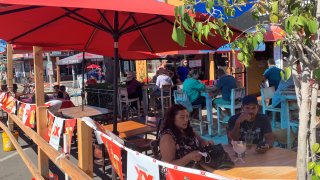
Newport Avenue in Ocean Beach
There are hundreds, perhaps thousands of restaurants, gyms, salons and other businesses in San Diego County that, during the pandemic, took advantage of the weather, moving operations outside, often building elaborate, beautiful structures to entice their clientele to return.
All of the structures built in the city of San Diego, at least, were erected during a time when an emergency ordinance permitted them to operate, free of many of the building codes crafted and enforced to keep people safe.
Since the beginning of the pandemic, the city issued more than 400 permits for businesses to expand their services into parking spaces and sidewalks. Whats' not known, though, is how many were built by businesses without official approval.
Get San Diego local news, weather forecasts, sports and lifestyle stories to your inbox. Sign up for NBC San Diego newsletters.
Technically, the state's reopening on June 15 suspended the state's mandatory social distancing, which would have done away with the need for the emergency ordinance. Moves were afoot in city hall to extend the emergency ordinance regarding the parklets. That same month, the city said it was working on a program that would allow business owners to make their outdoor space permits permanent.
This summer, however, officials from America's Finest City have cast a bureaucratic glance at the so-called parklets, and, last month, the city said the structures would be required to come into compliance with the city's temporary outdoor business operations guidelines.
City leaders presented four possible permit options:
- Streetaries: Outdoor spaces created in areas formerly dedicated to parking spaces that serve as an extension of the restaurant or bar. Also known as a parklet
- Social curbs: Permanent extension of the curb into the parking lane to facilitate a variety of activities such as recreational and outdoor dining
- Outdoor dining within the private property: Outdoor dining in parking lots of a permitted eating and drinking establishment
- Promenade: Partial or complete street closure to vehicular traffic to facilitate walking, biking, recreation and outdoor dining
However, to obtain a permit for any of the options, business owners would have to meet certain requirements and pay a fee.
Local
In July, the city granted time to restaurants to bring outdoor dining sections up to code after the city extended the compliance deadline of Aug. 2, with the San Diego Fire Marshal Doug Perry saying some structures posed a safety risk and made it harder for firefighters to get hoses and ladder trucks to buildings.
And there were other problems, Perry said: Multiple unoccupied dining sections collapsed in Pacific Beach and a massive permitted tent blew down in Rancho Bernardo.
Top concerns on the city's radar included unpermitted structures, propane heaters under tents and wooden ceilings, businesses blocking red curbs along the sidewalk and businesses not conforming with their original issued permit. Perry also had concerns about electrical issues, such as extension cords stretched over sidewalks and improperly wired lights, heaters and even televisions.
Another concern the city had was stormwater runoff -- many of the structures were built butted up against the curb, preventing runoff or trapping debris underneath them, possibly creating unsanitary conditions.
And so, on Monday, city code enforcement investigators went to 14 sites around the city that officials had received requests to investigate, and on Tuesday -- paperwork -- the administration of the process took place.
Eleven of those businesses -- which, so far, the city has declined to identify -- were determined to be in violation, according to Scott Robinson, a supervising public information officer with the city of San Diego. One of the 11 did have a temporary outdoor business operation (TOBO) permit, Robinson said, and will be reinspected in September.
Robinson said the compliance investigations will broaden on Wednesday, when the city "will start proactive investigation throughout the city on businesses that do not have TOBO permits and without any open request for code enforcement investigation on the business or property."
As for those 11 businesses -- they were given instructions on coming into compliance and verbal warnings were issued regarding the need to get a permit within 10 days or remove their outdoor dining areas.
The penalty? A hundred dollars a day per violation after they have received notice of the violation.
If, after the businesses receive a notice, the location remains noncompliant, a hearing would be set afterward. If all violations are corrected prior to the hearing date, the fines would be waived, said Robinson, who added the motivation by the city is not to collect fees, but, rather, to keep the public safe.
But will that penalty be enough to persuade restauranteurs when an outdoor restaurant can make hundreds of dollars a day serving customers in their outdoor dining structures?